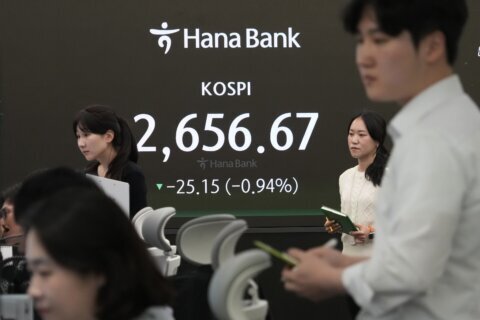BEIJING (AP) — China’s government rejected U.S. accusations of forced labor in Xinjiang and accused Washington on Thursday of hurting global trade after lawmakers endorsed import curbs and American companies were warned they face legal risks if they do business with the region.
The measures add to rising pressure on companies that buy clothing, cotton, tomatoes and other goods from Xinjiang, where the ruling Communist Party is accused of holding more than 1 million members of mostly Muslim ethnic groups in detention camps. Washington has blocked some imports, while Beijing has whipped up Chinese consumer anger at brands that express concern about possible forced labor.
“The so-called human rights and forced labor issues in Xinjiang are completely inconsistent with the facts,” said a Ministry of Commerce spokesman, Gao Feng.
“The U.S. approach has seriously undermined the security and stability of the global industrial chain and supply chain,” he said. “China firmly opposes it.”
Gao gave no indication of possible Chinese retaliation.
The latest measure approved Wednesday by the U.S. Senate would block imports of goods made with forced labor in Xinjiang. The bill requires approval from the House of Representatives.
On Tuesday, the Commerce Department and five other agencies warned companies with ties to the region they “run a high risk” of violating U.S. laws against forced labor.
In unusually forceful language, they said Beijing carries out “genocide and crimes against humanity” in Xinjiang including imprisonment, torture, rape, forced sterilization, forced labor and “draconian restrictions” on movement and religion.
Chinese officials deny accusations of abuses in Xinjiang. They say the camps are for job training and combating radicalism.
Washington and the European Union have imposed travel and financial sanctions on Chinese officials accused of abuses in Xinjiang. The United States has blocked imports of cotton, tomatoes and materials to make solar panels from companies suspected of using forced labor.
Beijing retaliated by announcing unspecified penalties against American and European officials, a European think tank and two European researchers who study Xinjiang.
State TV called for a boycott of Swedish retailer H&M after it joined other brands in expressing concern about reports of forced labor in Xinjiang. State media have publicized calls by individual Chinese for boycotts of Nike, Adidas, Uniqlo and other global shoe and clothing brands.
___
U.S. business advisory: www.state.gov/xinjiang-supply-chain-business-advisory/
Copyright © 2024 The Associated Press. All rights reserved. This material may not be published, broadcast, written or redistributed.






